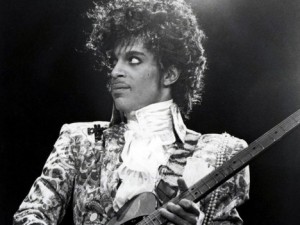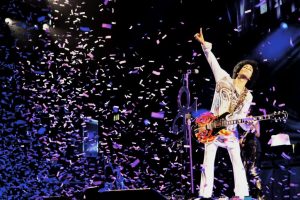The iconic recording artist Prince has died at the age of 57, the Star Tribune reported. Authorities were called to the musician’s Paisley Park recording studios Thursday morning in Chanhassen, Minnesota, which is located in a suburb west of Minneapolis.
A cause of death has not been released.
Minnesota’s non-profit music radio station The Current is streaming Prince’s music non-stop, beginning at 1 pm CST. You can listen to it here. On the West Coast, Seattle’s KEXP is also streaming Prince’s music here.

Prince, whose full name is Prince Rogers Nelson, was on tour just last week. On April 7, the Atlanta Journal Constitution reported he postponed two concerts due to illness. However, after performing a second rescheduled show in Atlanta on April 15, his private jet made an emergency medical landing in Illinois. He was rushed to the hospital, but released a few hours later. He performed the following day and announced that he had been suffering from the flu.
Born and raised in Minneapolis, Prince was not only known for forging new sounds wrapped in funk, R&B, pop and rock, but also his flamboyant, sexual style.
 His 1978 debut, For You, cracked the Billboard Top 200 and in the following three years he released three more landmark records: 1979’s Prince, 1980’s Dirty Mind and 1981’s Controversy. But it was the next two albums — 1982’s 1999, featuring the hits “1999,” “Little Red Corvette” and “Delirious,” and 1984’s Purple Rain, which included “When Doves Cry,” “Let’s Go Crazy” and the anthemic signature tune “Purple Rain,” that catapulted him into stardom.
His 1978 debut, For You, cracked the Billboard Top 200 and in the following three years he released three more landmark records: 1979’s Prince, 1980’s Dirty Mind and 1981’s Controversy. But it was the next two albums — 1982’s 1999, featuring the hits “1999,” “Little Red Corvette” and “Delirious,” and 1984’s Purple Rain, which included “When Doves Cry,” “Let’s Go Crazy” and the anthemic signature tune “Purple Rain,” that catapulted him into stardom.
The Purple Rain film, which featured Prince and then-girlfriend Apollonia tooling around the Twin Cities on his motorcycle, dipping into Lake Minnetonka, one of the city’s most celebrated lakes, and performing at the legendary First Avenue night club, sealed his image as one of modern music’s most interesting and influential artists.
With the release of 1987’s Sign O’ the Times, and in particular its title track, Prince cast a jaundiced eye on some of society’s plights, including addiction and AIDS. But it seemed a final salvo as many felt his work after that point, while often still delivering some of his well known sexual come ons (“Cream,” “Kiss”), did not seem to be in touch with the social landscape’s peaks and valleys as much as his previous work.
By 1992, Prince, often referred to as the “Purple One,” eschewed his given name for a unpronounceable glyph. For the next few years he was also in a bitter struggle with his label, Warner Bros., and by 1998 he had largely stopped recording even though it was well known he has hundreds upon hundreds, if not thousands, of recordings that to this day remain unreleased.
In a 1999 interview I conducted with Prince, in advance of the release of his album Rave Un2 the Joy Fantastic and his first outdoor performance in his hometown, Prince talked about his new music, songs he had written for The Time (some of which he said he wished he would have kept for himself) and discussed freeing himself from Warner Bros. and finding faith as a Jehovah Witness.
“I know that people want to talk about the past,” he said. “But we’re not at Purple Rain anymore. We don’t look like that, we don’t dress like that, we’re different people now. If you talk about that, the next thing you know, people start writing things like the Revolution is going to reunite!
“I can’t really tell you why I decided to do things, because they’re decisions in the past and to go back and try to remember why I agreed to things before is difficult. I am living in today and looking forward.”
Over the course of his career Prince was nominated for 32 Grammys and won seven. Prince, who had remained elusive and performed infrequently over the course of the last dozen years, had begun performing more regularly and this year embarked on a series of surprise shows in intimate venues throughout North America on the “Piano and Microphone” tour. It was reported that at a March 26 concert in Toronto, he performed 57 songs, five encores, and a cover of David Bowie’s “Heroes.”
